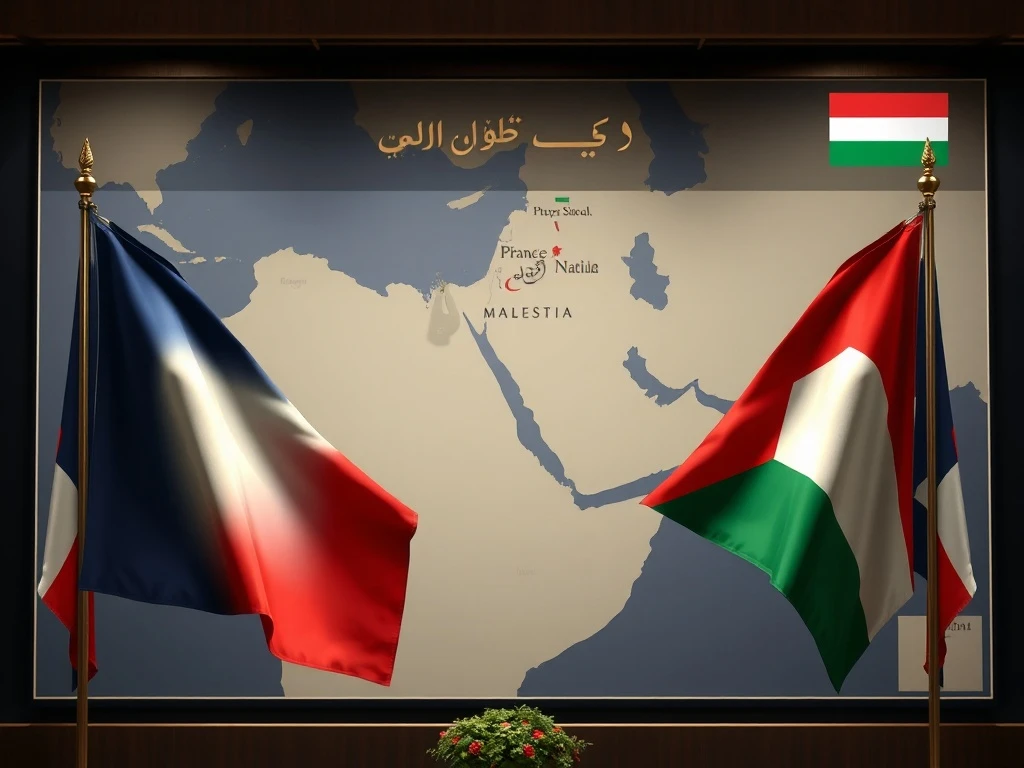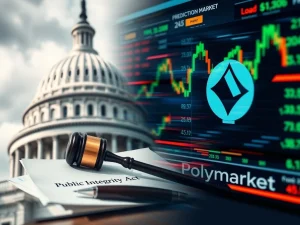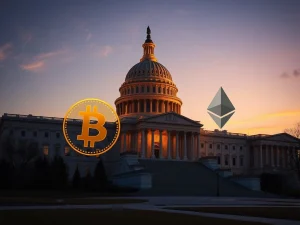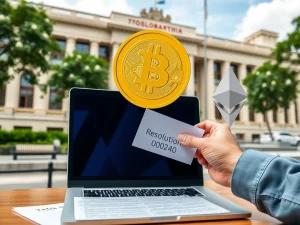France’s Historic Leap: First G7 Nation Recognizes Palestinian Statehood, Reshaping Middle East Geopolitics

In a move that has sent ripples across the international diplomatic landscape, France has officially announced its decision to recognize Palestinian statehood. While this development might seem distant from the daily fluctuations of cryptocurrency markets, significant geopolitical shifts often have broader implications for global stability, investor sentiment, and economic policies, indirectly influencing even the most decentralized assets. This groundbreaking decision by France, the first G7 nation to take such a step, is poised to reshape discussions around the future of the Middle East and international law.
France’s Groundbreaking Stance: First G7 Nation to Recognize Palestinian Statehood
President Emmanuel Macron’s mid-July 2025 announcement confirming France’s intent to recognize Palestinian statehood marks a pivotal moment in European foreign policy. This move, set for formalization during the September 2025 United Nations General Assembly session, positions France as the first G7 nation and the largest Western power to extend official recognition to the State of Palestine. Macron framed the decision as a continuation of France’s “historic commitment to a just and lasting peace in the Middle East,” a sentiment reiterated across various official channels. This bold step comes amid escalating humanitarian crises in Gaza, adding layers of complexity to an already volatile region.
The decision has naturally elicited strong reactions globally. Israel has condemned the move as “a direct affront to our national security,” while the U.S. State Department voiced “concern” over its potential to destabilize ongoing diplomatic efforts. Analysts suggest that France’s recognition could complicate U.S.-led negotiations by altering the geopolitical balance, potentially pressuring other European nations to follow suit. This development underscores the intricate web of international relations and the diverse approaches nations take toward resolving long-standing conflicts.
Decoding Macron’s Recognition: A Strategic Move?
What drives President Macron’s decision for this significant Macron Recognition? Domestically, it aligns with his broader strategy to position France as a key mediator in Middle Eastern affairs. Macron has consistently advocated for a ceasefire in Gaza and increased humanitarian aid, framing the recognition as both a moral imperative and a pragmatic step toward long-term stability. This approach reflects a desire to assert French influence on the global stage, distinct from the traditional U.S.-led diplomatic frameworks.
However, critics within France argue that this move risks straining ties with Israel and potentially undermining France’s influence within U.S.-aligned global initiatives. The balancing act between moral conviction, national interest, and international alliances is a delicate one. By recognizing Palestine, France also implicitly reinforces the UN-recognized 1967 borders as the foundation for a two-state solution, a stance previously supported by the European Union but not yet unilaterally adopted by its member states.
The Ripple Effect: How Middle East Geopolitics Are Shifting
France’s decision has reignited crucial debates about the role of international law in resolving the Israeli-Palestinian conflict. This alignment with Palestinian aspirations has garnered praise from several Arab and African nations, though some regional actors have urged caution to prevent further escalation of tensions. The implications for Middle East Geopolitics are profound, potentially encouraging other European nations to re-evaluate their positions.
The international community remains notably divided. While the European Parliament has historically supported Palestinian statehood, individual member states have hesitated to act unilaterally. France’s bold step could serve as a powerful catalyst, with reports indicating that Germany and the United Kingdom are now reviewing their own positions. Meanwhile, non-Western powers like China and and Russia have welcomed the move as a step toward “multilateralism and justice,” though their statements carry less immediate geopolitical weight in this context compared to Western reactions.
Is a Two-State Solution Closer? International Reactions and Future Outlook
As the September UN session approaches, the focus will inevitably shift to potential diplomatic countermeasures. Israel has already hinted at reconsidering its diplomatic ties with France, while the U.S. has signaled the possibility of sanctions against European partners supporting unilateral actions. Analysts caution that this recognition could significantly delay or restructure ongoing peace talks, especially if key stakeholders perceive the move as undermining the U.S.’s role as the primary mediator in achieving a Two-State Solution.
The path forward is complex, filled with diplomatic challenges and opportunities. While the immediate direct impact on cryptocurrency markets remains negligible, as industry experts have observed no corresponding moves or statements from crypto leaders regarding France’s decision, the broader implications for global stability and international relations are undeniable. A more stable global environment, even indirectly, can foster confidence across all asset classes, including digital ones. Continuous monitoring of these geopolitical shifts is always advised, as they can subtly influence the economic backdrops against which all markets operate.
Frequently Asked Questions (FAQs)
1. Why did France decide to recognize Palestinian statehood?
France’s decision, announced by President Emmanuel Macron, is framed as a commitment to a just and lasting peace in the Middle East. It aligns with France’s broader strategy to act as a mediator in the region, advocating for a two-state solution based on the 1967 borders and responding to escalating humanitarian crises in Gaza.
2. How does France’s recognition differ from other European nations?
While the European Parliament has historically supported Palestinian statehood, individual EU member states have largely refrained from unilateral recognition. France is the first G7 nation and the largest Western power to officially recognize Palestine, potentially catalyzing similar moves from other European countries like Germany and the UK, who are reportedly reviewing their positions.
3. What are the immediate reactions from Israel and the United States?
Both Israel and the United States have strongly criticized France’s decision. Israel condemned it as “a direct affront to our national security,” while the U.S. expressed “concern” over its potential to destabilize ongoing diplomatic efforts and hinted at possible sanctions against European partners supporting unilateral actions.
4. What are the potential long-term implications for the Israeli-Palestinian conflict?
France’s recognition reinforces the legitimacy of a two-state solution based on 1967 borders and international law. While it has been praised by many Arab and African nations, analysts warn it could complicate U.S.-led negotiations and potentially delay or restructure peace talks if it’s perceived as undermining the U.S.’s mediation role.
5. Is there any direct impact on cryptocurrency markets from this decision?
As of now, industry experts have observed no direct corresponding moves or statements from crypto leaders or discernible impact on cryptocurrency markets regarding France’s decision. The event is primarily geopolitical, though broader global stability (or instability) can indirectly influence investor sentiment across all financial sectors, including crypto.









